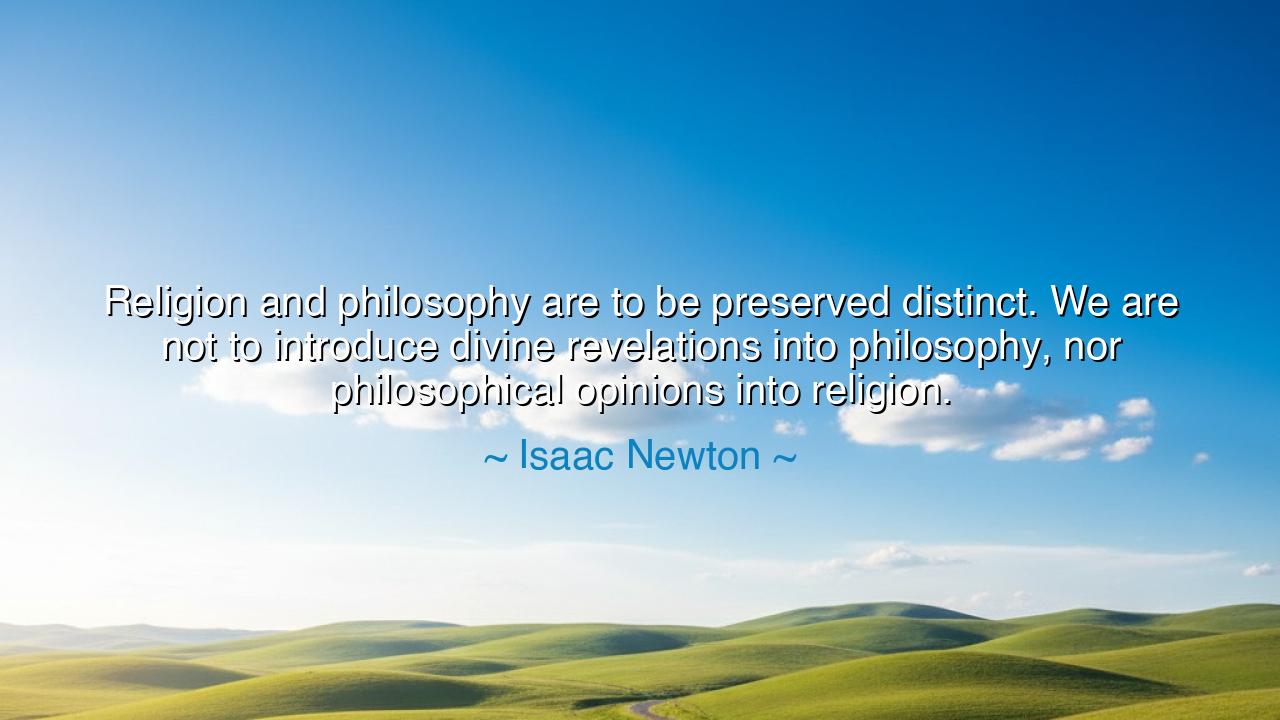
Religion and philosophy are to be preserved distinct. We are not
Religion and philosophy are to be preserved distinct. We are not to introduce divine revelations into philosophy, nor philosophical opinions into religion.






"Religion and philosophy are to be preserved distinct. We are not to introduce divine revelations into philosophy, nor philosophical opinions into religion." These words spoken by the great Isaac Newton reflect a profound tension that has existed through the ages between reason and faith. Newton, a man of profound scientific intellect, urges us to maintain a clear boundary between the realms of philosophy and religion—to keep the tools of reason separate from the divine truths of faith. In his time, Newton was both a man of science and a devout believer in God, yet he saw that the two must not be confused or conflated. The wisdom of this statement lies in recognizing that while both philosophy and religion seek to explain the truths of existence, they do so through different means—philosophy through the lens of human reason, and religion through the guidance of divine revelation.
This tension between reason and faith was not new to Newton's time. The ancient Greeks struggled with this same divide, especially in their conception of the divine. Plato, in his dialogues, envisioned a perfect world of forms, an ideal realm of eternal truths that could only be understood through the intellect. However, Plato also acknowledged the role of the gods in shaping human affairs, though he reserved their influence for the spiritual realm, not the realm of reason. Plato’s distinction between the world of ideal forms and the practical world was an early attempt to separate philosophical reasoning from divine intervention. His teachings suggest that reason should guide us in the material world, but faith—the divine revelations—transcends what the human mind can grasp through logic alone.
Consider the life of Aristotle, Plato’s most famous student, whose influence on philosophy extended far beyond his own time. Aristotle’s vision of reason as the supreme tool to understand the universe led him to view religion not as a domain for rational inquiry, but as a matter of faith and tradition. While Aristotle’s work laid the foundation for logic and empiricism, he also acknowledged the gods but kept them firmly outside the realm of philosophical discourse. For him, reason was the key to unlocking the mysteries of the physical world, while religion was meant to provide comfort, meaning, and order beyond the reach of human understanding. Newton, like Aristotle, understood the necessity of maintaining a distinct line between reason and revelation.
Newton’s own life embodies the complex relationship between faith and reason. While he is often hailed as the father of modern science, his writings also reveal a deep and personal connection to God. However, Newton’s faith was never something he sought to integrate into his scientific works. In his Principia Mathematica, Newton used the tools of mathematics and physics to explain the laws of the universe, carefully avoiding any attempt to explain the divine through science. His work was a product of human reason, yet his belief in God was a matter of spiritual revelation—a separation that Newton believed was necessary to preserve the integrity of both realms. His quote reflects the wisdom of understanding that the tools of faith and the tools of reason must remain distinct in order to avoid confusion and potential dogma.
The importance of separating religion from philosophy can also be seen in the life of Galileo Galilei, whose scientific discoveries challenged the established religious views of his time. Galileo’s observations with the telescope provided clear evidence that the Earth was not the center of the universe, as the Church had long believed. Yet, despite his faith in God, Galileo was forced to defend his scientific findings against religious authorities who believed that the scriptures held ultimate authority over all truths. Galileo's struggle is a powerful reminder of the consequences of blending faith with reason in areas that are not meant to intersect. Science must operate within the framework of empirical evidence, while religion operates on the foundation of revelation and spiritual truths. To merge the two, as Galileo discovered, can lead to conflict and compromise.
The lesson in Newton’s words speaks to us today in a world where reason and faith continue to be at odds in many ways. We must understand the value of both philosophy and religion, yet we must approach them as distinct paths to understanding. Reason is the tool through which we explore the world, understand nature, and solve the practical problems that face us. Faith, on the other hand, is the way in which we understand our spiritual lives, our purpose, and our relationship to the divine. While both are essential, we must resist the temptation to allow one to distort or limit the other.
In practical terms, we can take Newton’s insight and apply it by approaching our lives with a balanced respect for both reason and faith. When we are in the realm of science, let us focus on evidence, logic, and empirical data. When we are in the realm of spirituality or religion, let us honor the divine mysteries and revelations that go beyond human understanding. By maintaining this separation, we can preserve the integrity of both, allowing each to flourish in its own domain. Faith and reason, when kept distinct, enrich our lives and lead us toward a more profound understanding of the world and the universe.






AAdministratorAdministrator
Welcome, honored guests. Please leave a comment, we will respond soon